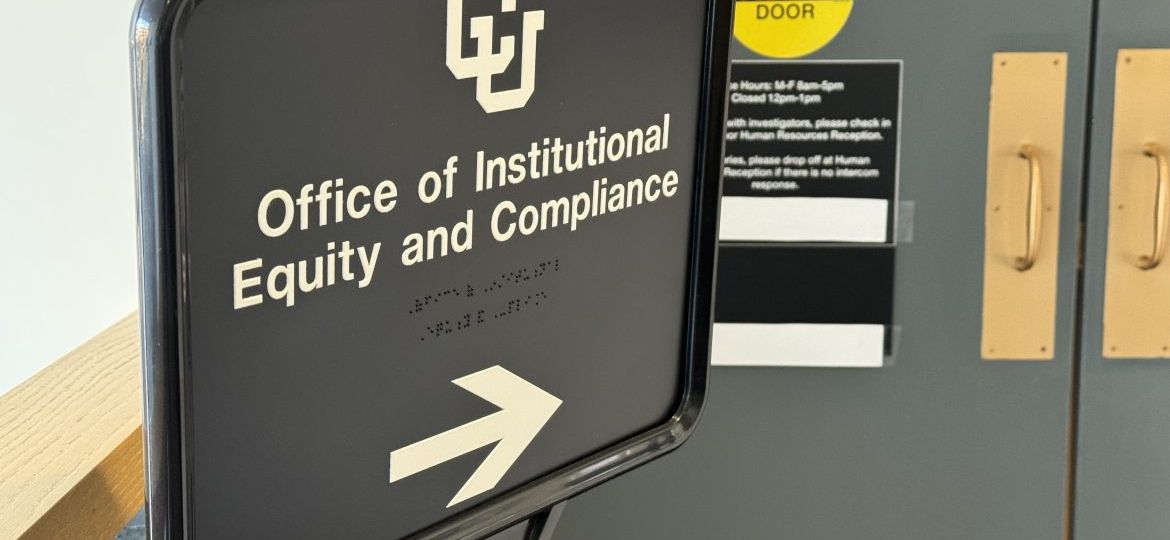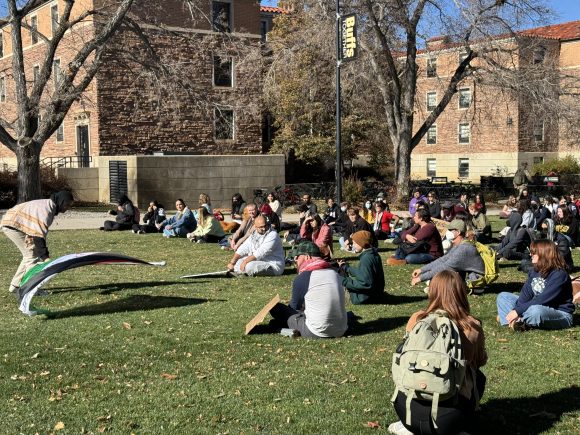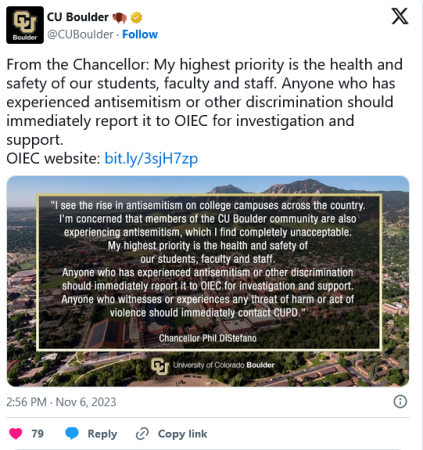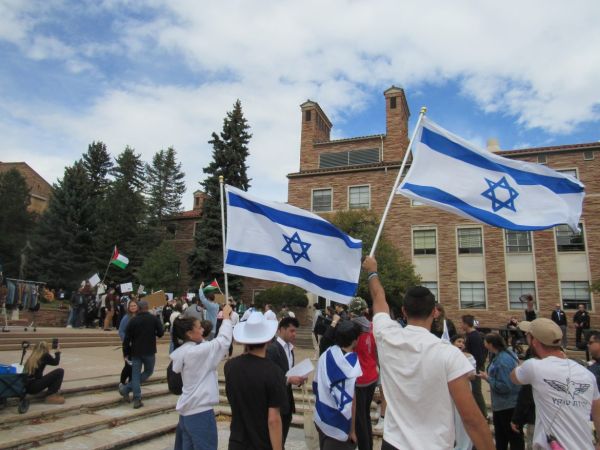
‘At a boiling point’: Antisemitic, Islamophobic discrimination reports skyrocket following Israel-Hamas war
Reports of antisemitic and Islamaphobic discrimination are on the rise at the University of Colorado Boulder, mirroring national trends, according to the university’s Office of Institutional Equity and Compliance.
Since the start of the Israel-Hamas war on Oct. 7, reports have increased at a rate 11 times higher than the same period last year.
OIEC data shows there were 29 antisemitic discrimination or harassment reports between Oct. 7 and Nov. 14 of this year. There were 15 reports of Islamaphobic discrimination or harassment in the same timeframe.
By comparison, just two instances of each type of discrimination were reported during the same timeframe in 2022.
Reported discrimination from Oct. 7 to Nov. 14

The rise comes after Hamas militants launched a coordinated attack on Israel on Oct. 7 that killed 1,200 people and resulted in more than 200 Israeli hostages. Since then, Israel has launched an unprecedented attack on Gaza, killing an estimated 11,100 people, according to Gaza’s Health Ministry.
The attacks on both sides have led to mass protests across the U.S. and the world.
At CU Boulder, several student groups and local organizations have hosted vigils, demonstrations and educational events to bring awareness to the conflict and worsening humanitarian crisis in Gaza. On several occasions, groups for and against the continuation of the war protested just feet from each other in tense encounters in the past weeks.
As reports of discrimination rise, so do frustrations with CU Boulder’s response
Some students who said they’ve experienced protected class discrimination and harassment were also affiliated with a variety of cultural and activist groups on campus involved in political demonstrations surrounding the conflict.
Fatima Pasha, the president of CU Boulder’s Muslim Student Association, said she heard Islamaphobic comments directed at her and other Muslim students while participating in pro-Palestine protests and while walking around campus.
“It’s just more outwards,” Pasha said. “You always got the stares, but now you get the stares and a hate comment while you’re walking.”
Pasha said she’s been called a “terrorist” and has heard counterprotesters yell “fuck Palestine” and “go back to your country” during demonstrations.
Still, Pasha has not made any reports to the Office of Institutional Equity and Compliance concerning these incidents and was surprised when she heard there had been so many reports of Islamaphobic discrimination or harassment.
“(Muslim students) know that OIEC is not gonna stand up for us, so what’s the point?” she said. “I definitely think there’s much more that happens that doesn’t get reported because everyone knows that OIEC has a bad reputation amongst Muslims specifically.”

According to the Office of Institutional Equity and Compliance’s website, community members can report unfair treatment or intimidating behavior aimed at any member of the campus community based on an aspect of identity protected by CU Boulder policy.
Reporting allows the university to pursue “resolution processes,” connect those involved with support services and identify institutional risks.
Those found responsible for this kind of discrimination or harassment could face punishment as extreme as expulsion or employment termination following an investigation and adjudication process.
“(OIEC) takes every report of discrimination seriously and evaluates them in light of CU Boulder’s obligation to provide a safe learning environment in which students will live and study,” Llen Pomeroy, the associate vice chancellor for OIEC, wrote in a statement. “It can sometimes be difficult for people to recognize the difference between protected speech and non-protected acts of discrimination and harassment. We encourage people to report to OIEC even if they aren’t sure the behavior violates a university policy. If an investigation-based response is not the right avenue, the OIEC will always discuss other informal resolution options and support resources.”
Other students who say they’ve witnessed discrimination or harassment echoed Pasha’s lack of faith in the university to take action once a complaint has been filed. Some had mixed feelings about the reporting process.
Omer Hart, president of the Buffs4Israel student group, said he filed two reports to the OIEC in the last month.
He filed one after setting up a table in the University Memorial Center for people to write letters to members of the Israeli Defense Force.
According to Hart, a man approached the table with a letter that said “fuck you” and “genocidal pigs.” The man later told Hart, who was born in Israel, that he was talking about “the Israelis,” not Jewish people.
However, Hart said he wasn’t hopeful the reports he filed with OIEC would do much.
“They haven’t really been much help,” he said. “I’ve been reporting everything to OIEC, but I don’t know what’s going to happen with it.”
Alexandra Philippidis, a postgraduate student and instructor at CU Boulder, said she was encouraged to make an OIEC report about another Ph.D. student who liked social media posts that disparaged American politicians supporting Palestinian demands for a ceasefire and compared calls for a ceasefire to being supportive of terrorism.
“I was severely uncomfortable because of how awful these tweets are that they’re liking on a public account and because I am … a teaching assistant. I am a mandatory reporter,” she said.
Philippidis said the Office of Victim Assistance told her the report didn’t meet the high burden of evidence OIEC requires to take action on a discrimination or harassment complaint, but the office would document the report in case any others were made in the future.
Yehuda HaLevi, the co-founder of the pro-Israel student group Buffs Believe, has made a number of reports to OIEC in the past. HaLevi said he was threatened while fundraising for first responders and medical equipment in Israel.
“(A person) came up to us and started yelling at us,” HaLevi said. “(He) told us that we killed his family, and as his friends were trying to pull him away, he said, ‘I’m coming back, and I will kill you.’”
HaLevi said he called the police after the incident. The report is now under investigation. Still, he said the increase in reported antisemitism has made it difficult to turn to CU Boulder for help.
“Jewish students are hesitant to rely on their administration and these resources because we don’t feel supported by the university,” HaLevi said.
University responses to discrimination and harassment
Chancellor Phil DiStefano, in a statement posted to university social media on Nov. 6, encouraged anyone who has experienced antisemitism or “other discrimination” to report the incident to OIEC.
“I see the rise in antisemitism on college campuses across the country. I’m concerned that members of the CU Boulder community are also experiencing antisemitism, which I find completely unacceptable,” the statement read.

According to OIEC, Jewish identity is included in the categories of protected-class identities under campus policy and can be expressed in the form of racial, ethnic, religious and ancestral identity. University policy also prohibits antisemitic harassment and discrimination.
In recent weeks, a number of students have criticized the university’s response to a controversial statement published by the ethnic studies department on Oct. 23. The statement, which supported a “free Palestine,” was criticized by Jewish community members and advocacy groups for not condemning Hamas.
While CU System President Todd Saliman decried the statement as “appalling,” campus leadership walked a finer line.
“The statement recently posted on the Department of Ethnic Studies website is not an official CU Boulder position on the Israel-Hamas War,” DiStefano wrote in a message published Oct. 26.
The student opinion on the ethnic studies department statement, which has since been taken down, is split. Some pro-Israel students said they wanted the school to forcefully condemn the message.
“The university has not done (its) job, (its) due diligence to condemn this department,” HaLevi, the Buffs Believe co-founder, said.
However, some pro-Palestinian students said the university should apologize for not embracing it.
“I think the university should issue a public apology for their statement and what they did to the department of ethnic studies that created this environment,” Pasha, the president of the Muslim Student Association, said.
University officials have said the campus is taking steps to help ensure the safety of vulnerable groups.
“The university’s top priority is, and always has been, creating a safe environment for everyone on campus,” wrote Steve Hurlbert, communications director at CU Boulder, in an emailed statement. “The CU Boulder Police Department is monitoring local, national, and international events and has been in contact with multiple other local and national law enforcement agencies since the conflict began.”
Hurlbert declined to say which agencies have been contacted and what specific safety measures have been taken.
Megan Burmeister, the interim executive director of CU Boulder Hillel, said the Jewish community organization has had a police officer present at all its meetings with more than 10 students in attendance since Oct. 7. The organization has also hired a private security firm as an additional precaution.
“We know that antisemitism is on the rise, and we just don’t know what our unknown threats are,” Burmeister said. “So we have to just make sure that our students are safe at all times.”
Pasha, the president of the Muslim Student Association, has also worried about finding a safe place for Muslim students to gather. In recent weeks, she’s worked to find a new place for prayer for the student association.
“Now that all of these things are happening, and there’s high Islamophobia, and students feel even less safe than they were before, we need a safe space for Muslims on campus,” she said.
Bias on campus reflects a state and national uptick in hate
CU Boulder’s sharp rise in discrimination complaints matches trends across the country, according to data from the Council on American Islamic Relations and the Anti-Defamation League.
The Council on American Islamic Relations received 1,283 complaints of anti-Muslim or anti-Arab bias between Oct. 7 and Nov. 4. That’s three times higher than the national organization receives in an average month and twice as high as the number CAIR received during the same time in 2022, according to CAIR Research and Advocacy Director Corey Saylor.
“When you have a lot of politicians bashing on a minority, that tends to cause backlash against the minority,” Saylor said in an interview. “We’ve been saying this is the largest wave of anti-Muslim and Islamophobic bias since December 2015.”
In December 2015, Donald Trump, then campaigning for the presidency, called for a ban on immigrants from majority-Muslim countries, which Saylor said prompted the increase.
This year, between Oct. 7 and Nov. 7, the Anti-Defamation League says it counted 832 antisemitic incidents of assault, vandalism and harassment across the U.S., roughly three times the number the ADL tallied during the same period last year.
Critics of both advocacy groups have called their descriptions of bias overbroad and said they conflate criticism of opposing political and territorial claims with religious or ethnic bias.
Nonetheless, Colorado reflects these national trends – including within higher education.
“What’s happening nationwide-, we are seeing similar trends here in Colorado,” said
Jeremy Shaver, the senior associate regional director for the ADL Mountain States Region. “The increase that we’re seeing nationwide and locally is felt pretty intensely on U.S. college campuses.”

Shaver said Jewish community members at CU Boulder have reported threatening phone calls, concerns over pro-Palestinian rallies and one incident where a touring high school student performed a Nazi salute in front of pro-Israel demonstrators.
“When things go from beyond expressing values and concern and support for a cause into using extremist slogans and rhetoric, rhetoric that tries to justify terror, that’s where we’re concerned,” Shaver said. “That’s what is making … a campus environment feel unsafe for Jewish students.”
Dr. Reema Wahdan, director of the Colorado Palestine Club, said her organization has also seen a sharp increase in bias against Palestinian and Muslim students.
“Tensions run so high that it’s now at a boiling point,” she said.
Wahdan, whose house was shot at on Oct. 13 in an incident that is still under investigation, said some students who have voiced support for Palestine have had compromising information posted online about them by national groups like Canary Mission.
“Some of the tactics that are being used, at least at the college campuses, (are) doxxing campaigns for any pro-Palestinian students, allies, supporters,” Wahdan said. “Specific organizations are taking additional steps to create online domains that essentially use a student’s first and last name, and they create a site identifying them as antisemitic.”
Shaver and Wahdan said the first step towards cooling hostilities needs to be recognizing the immense pain shared by people connected to both sides of the conflict.
“(With) any dialogue, you have to start at a very basic level to recognize the suffering that multiple groups of people are experiencing,” Shaver said. “Not only there in Israel and in Gaza, but across the globe, because these are diaspora communities.”
“The approach that we want from every school, university and every leader is to recognize that both sides are grieving. That both sides have lost. That both sides have been induced into a form of trauma,” Wahdan said. “It’s that simple.”
Contact CU Independent & The Bold Special Investigations Editor Henry Larson at henry.larson@colorado.edu.
Contact CU Independent Managing Editor Kiara DeMare at kiara.demare@colorado.edu.

